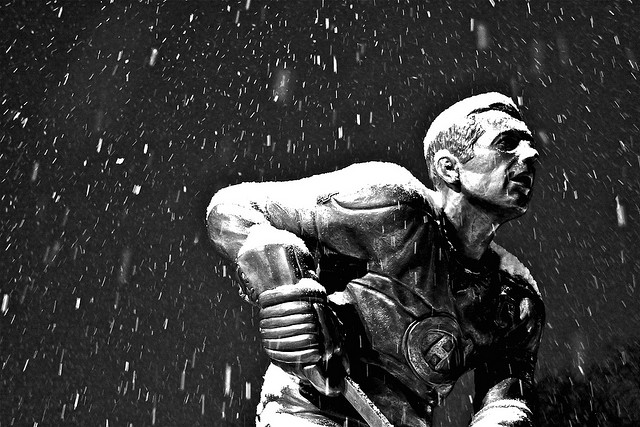Gentleman Jean. I met Jean Béliveau in 1976 in his vice-president’s office at the Montreal Forum. I was writing a play on the Canadiens. Ken Dryden, who was their goalie and was helping with the play, arranged it.
Béliveau used the phrase, “making the play,” as a centre. I asked him to describe that. He did, with great specificity: all the components he had to take into account, which meant everything happening on the ice, including the speed of each player, their vectors, who was coming back to cover, where they’d be in fractions of seconds.
To fill his role as a centre he had to calculate it all instantaneously, then make the play. I asked if he thought about it or was it instinctive. He said, Of course it’s instinct. Then he paused and said, No, you do think about it, but very quickly. It was the best articulation of the connection between instinct and intellect that I ever heard. Malcolm Gladwell needed an entire book called Blink.
Béliveau took me into the dressing room after a game. I’d been there before but not when it was filled with exhausted players. They lost that night, which was rare in those years; the mood was sullen and untalkative. In that room, as someone said, you didn’t lose and laugh.
I walked up one side, not knowing how to start a conversation, so I pretended I was only looking around. Béliveau walked discreetly up the other side as if he just happened to be there so that when I reached the other end, there he was to talk to. That’s my experience of what people call his grace and class. Then Guy Lafleur came over and he introduced us.
I opened Act 2 with Béliveau alone on the ice during a noon hour in his suit and skates, delivering a monologue. That act was set on the day of the game when the separatist Parti Québecois won its first election, roiling politics in Quebec and throwing the Rest of Canada into hysterics.
The election results were flashed on the scoreboard as they came in and the Forum went crazy. For players it was disorienting; they’d always been the sole, beloved focus of attention during games. It was Béliveau, a federalist, who decided to relay those results as they happened. He graciously attended our opening night.
***
Missing Rob Ford already. Watching the new mayor pay his respect to Rob, now a mere councillor, I realized I’ll miss this guy as mayor, sort of. Not because he was so much fun, or fodder. It’s the populism, perverse as it was.
I understood that only as I saw Tory take over. It’s as if everything is back in the right hands. He’s earnest, competent, measured (aside from his bizarre lack of generosity toward NDP members, reminiscent of how Paul Martin presaged his own demise by being petty).
What’s wrong with that package? Along with competence it spells exclusion — of those who don’t possess those qualities, who weren’t raised with them or the expectations that they too could become mayor or anchor on the nightly news.
Those people are Ford Nation, the ones who know they’re excluded and their normal role politically is to support people like Tory who will extend a friendly hand to them, and then be accordingly grateful. (There are Ford supporters among the Toryish elites, but I don’t consider them Ford Nation; they’re opportunistic voters who saw Rob as their best bet for lower taxes etc., not as someone to identify with.) If there was a dim upside to the Ford years it was that false promise of inclusion.
Populism is full of betrayal, starting perhaps with the premise of leadership itself. It always begins its betrayal by idolizing a leader. Tory, by way of contrast, is a patrician and cannot be otherwise. Those people will receive his goodwill and even some concrete aid but not the undefinable sense of self-worth that came with Rob.
It’s a conundrum. Tory is so presentable, he’s like the dates you take home to meet the family, but too often the one you truly adore is the one who would offend them and break their hearts, along with your own.
This column was first published in the Toronto Star.
Photo: Guy Mayer/flickr



